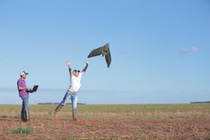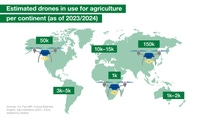Simplify with technology
to support farmers in doing

Agriculture
From the steep rice terraces of China to the sprawling soybean fields of Brazil, drones are no longer just the top toy on kids’ wish lists or a last resort option to deliver life-saving medicine to remote areas. They are quietly – and rapidly – changing the face of farming. As the agricultural industry transforms to meet the dual challenges of sustainability and productivity, a new question arises: Will swarms of spray drones replace traditional farm machinery or will they find their place alongside them? It turns out, the future of digital farming is not a competition, but a collaboration.
Once upon a field, agriculture was dominated by powerful giants: mighty tractors that roared across uniform rows, covering vast stretches of farmland with strength and efficiency. But today, a new kid on the block is taking flight: the agricultural spraying drone.
Small, agile, and incredibly smart, drones are like young Davids entering the world of Goliaths. Where tractors might struggle – steep hillsides, muddy terraces, disconnected plots – drones swoop in effortlessly. Light on their rotors and packed with high tech cameras, sensors and precision application technology, they thrive where big wheels can’t go. And in times of labor shortage, they are a welcome relief for those who otherwise would have to walk through these inaccessible fields carrying 15 liters of water on their backs.
But spray drones are not only a smaller alternative, they also bring completely new talents to the field, such as precision spraying tall crops such as tree crops, sugar cane or corn and field mapping for weed, pest and disease detection.
“In the field, we are seeing a steady increase of farmers using new technologies, like drones, because they’re seeing concrete results,” says Konstantin Kretschun, Global Head of BASF Digital Farming. “And the data coming in show that farms that blend tradition with tech can reclaim profitability in an industry where margins are very thin.”
Compared to manual backpack sprayers or even some tractor-based systems, spray drones use less water per hectare. In addition, walking through crops to treat with sprayers is slow, labor-intensive, and physically demanding. Drones reduce the need for this grueling work and compared to large machinery, they are more affordable, especially for smallholders.
Agricultural drones include those for applying crop protection, broadcasting seeds and fertilizer, and monitoring fields with cameras or sensors. Farmers choose models based on their needs and local regulations.
In the field, we are seeing a steady increase of farmers using new digital technologies, like drones, because they’re seeing concrete results.
“Asia, with its large share of smallholders, remains the epicenter of drone adoption,” confirms Kretschun. In China, spray drones have already become mainstream, flying over rice paddies and weaving through fruit orchards where big machines simply can't navigate. This is why over 30 percent of crop protection spraying in China is already conducted using spray drones, according to DJI, one of the leading drone manufacturers based in China. Meanwhile, in South America, countries like Argentina, Brazil, and Colombia are rapidly embracing drones – not only for small-scale specialty crops but also in large-scale row crops, where drones are scouting fields and supporting better application decisions.
According to Fortune Business Insights, the global agriculture drone market was valued at 4.98 billion USD already in 2023 and is projected to grow to 23.78 billion USD by 2032.
But unlike in the classic story of David and Goliath, drones won’t topple the giant. They have rather come to work side-by-side. The future belongs to fields where both the agile and the strong work together. Large, uniform fields still benefit enormously from the strength and speed of big machines. Meanwhile, the nimble drones can complement with their bird’s eye view of fields from the sky.
“It’s a beautiful example of co-working if agricultural spraying drones scan fields and produce high-resolution maps, which tractors then use to adjust their spraying patterns, reducing inputs and therefore boosting sustainability,” says Pablo Provera, Senior Manager of Digital Excellence at BASF Digital Farming, Argentina. “By pairing our digital platform xarvio® FIELD MANAGER, with our drone imagery mapping service, farmers can optimize resources for weed control in fallow land by more than 60 percent.”
The quality of digital detection of pests and weeds from aerial images is expected to improve significantly in the coming years. Therefore, the future will not only see more drones, but also smarter ones.
Weed maps produced from drone flights are processed by xarvio® algorithms and used to enable localized herbicide applications, optimizing product use and resources, which supports sustainability.
The sky’s the limit, literally, when it comes to the future of drones in agriculture. Farmers and ag companies are already exploring swarms of drones flying in coordinated patterns to spray larger fields faster or even more sustainable solutions tailored for drone application, to name some examples. Agricultural innovators like BASF are working hard to not only adapt their solutions for drones but also to ensure farmers can turn drone data into meaningful outcomes, making crop protection more precise, more sustainable, and more productive.
“Drone technology is evolving at a rapid pace,” says Kretschun. “But hardware alone isn’t enough. True progress will come from marrying smart drones with smarter agronomic knowledge.” But like always, innovation takes people: companies, researchers, and farmers who are investing in the smart use of every tool available – whether it rolls or flies.
For media inquiries or to repurpose the story, please contact:
verena.kempter@basf.com
Published June 5, 2025 by Katie Lelito and Panagiota Boumpalou (BASF Global Agricultural Solutions).


